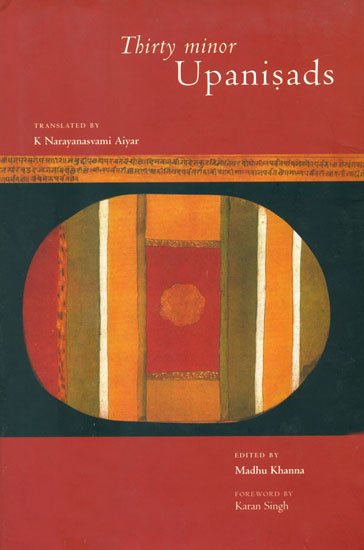Thirty minor Upanishads
by K. Narayanasvami Aiyar | 1914 | 95,228 words
This book contains the English translation of thirty minor Upanishads.—Fourteen belonging to Vedanta, two are categorised as Physiological, three are Mantra, two are Sannyasa and the remaining nine are categorised as Yoga-Upanishads. These Upanishads are properly defined as the Aranya-portion of the Vedas (most ancient Hindu scriptures) and are so-...
Subala Upanishad of Shukla-yajurveda, Chapter VI
"At first there was not anything in the least. These creatures were born through no root, no support but the Divine Deva, the one Nārāyaṇa.[1] The eye and the visible are Nārāyaṇa; the ear and the audible are Nārāyaṇa; the tongue and the 'tastable' are Nārāyaṇa; the nose and the 'smellable' are Nārāyaṇa; the skin and the tangible are Nārāyaṇa; manas and that which is acted upon by it are Nārāyaṇa; buddhi and that which is acted upon by it are Nārāyaṇa; ahaṅkāra and that which is acted upon by it are Nārāyaṇa; citta and that which is acted upon by it are Nārāyaṇa; vāk and that which is spoken are Nārāyaṇa; the hand and that which is lifted are Nārāyaṇa; the leg and that which is walked upon are Nārāyaṇa; the anus and the excreted are Nārāyaṇa; the genitals and the enjoyment of pleasure are Nārāyaṇa. The originator and the ordainer as also the agent and the causer of changes, are the Divine Deva Nārāyaṇa only. Ādityas, Rudras, Maruts, Vasus, Aśvins, the Ṛk, Yajus, and Sāma, Mantras, Agni, clarified butter and oblation—all these are Nārāyaṇa. The origin and the combination are the Divine Deva Nārāyaṇa only. Mother, father, brother, residence, asylum, friends and dependents are Nārāyaṇa only. The divine midis known as virājā, sudarśanā, jitā, saumyā, moghā, kumārā, amṛtā, satyā, sumadhyamā, nāsīrā, śiśirā, surā, sūryā, and bhāsvatī (fourteen nādis in all), that which thunders, sings and rains, viz., Varuṇa, Aryamā (sun), Candramas (moon), Kalā (part), Kavi (Śukra), the creator Brahma and Prajāpati, Indra, Kāla (or time) of days, half-days, Kalpa, the upper, and the directions—all these are Nārāyaṇa. That which was and will be is this Puruṣa only. Like the eye (which sees without any obstacle) the thing spread in the ākāś, the wise ever see this supreme seat of Viṣṇu. Brāhmaṇas who are ever spiritually awake, praise in diverse ways and illuminate the supreme abode of Viṣṇu. Thus is the exposition to the attaining of Nirvāṇa; thus is the teaching of the Vedas; yea, thus is the teaching of the Vedas."
